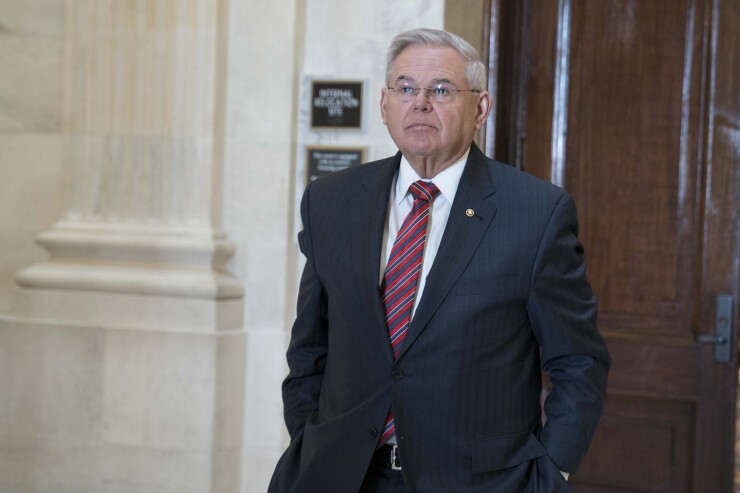
Public finance groups are pressing for clarity on municipal bond market assistance as part of the economic stimulus package the Senate is expected to vote on.
Senate Democrats voted as a bloc Sunday evening to stop consideration of an estimated $1.6 trillion relief package because of its perceived shortcomings, including the lack of provisions to assist state and local governments as well as other public debt issuers.
Senate Democratic Minority Leader Chuck Schumer told reporters shortly after midnight Sunday night that Democrats had “some serious problems with the bill” as proposed by Senate Majority Leader Mitch McConnell, R-Ky.
Schumer included in his list of shortcomings “no money for state and local governments, many of whom would go broke.”
Democratic Sen. Robert Menendez of New Jersey is proposing the inclusion of his
The bill McConnell offered Sunday does not include government instrumentralities and nonprofits such as hospitals and colleges that also issue tax-exempt debt. It also does not cover debt securities with maturities of longer than 10 years. The Menendez bill includes all of them.
The National League of Cities, the Government Finance Officers Association, the National Association of State Treasurers, the Securities Industry and Financial Markets Association, Bond Dealers of America, and the American Securities Association are backing the Menendez bill.
Current law largely precludes the Fed from buying munis except those with maturities of under six months, and it has been historically hesitant to wade into the muni market as a buyer of last resort during difficult financial times.
Then-Fed Chairman Ben Bernanke said in a 2008 letter to then-Rep. Paul Kanjorski, D-Pa.,that the Fed did not want new authority to lend to states and localities because such decisions were inherently political and jeopardized the freedom of localities from federal financial oversight.
A separate stimulus bill released Monday by House Democrats provides language similar to the Menendez bill.
Meanwhile, the
- Expansion of its Money Market Mutual Fund Liquidity Facility (MMLF) to facilitate the flow of credit to municipalities by including a wider range of securities, including municipal variable rate demand notes (VRDNs) and bank certificates of deposit.
- Facilitating the flow of credit to municipalities by expanding the Commercial Paper Funding Facility (CPFF) to include high-quality, tax-exempt commercial paper as eligible securities. In addition, the pricing of the facility has been reduced.
NLC Executive Director and CEO Clarence Anthony said in a press statement in support of the Menendez bill that the municipal bond market “is at a disturbing standstill, with investors pulling money out, causing interest rates to spike.”
“Cities, towns and villages rely on a well-functioning marketplace to ensure their financing and to underpin our national infrastructure network,” Anthony said in a press statement.
The Menendez bill would “ensure that the capital markets that keep their communities moving are healthy and sustainable as well," said Emily Brock of GFOA.
Fourteen Democratic members of the National Association of State Treasurers sent a letter to congressional leaders warning of the dire consequences if Congress fails to address the situation faced by state governments.
“If the current crisis continues and rainy-day funds eventually diminish, then policies to reduce expenditures and raise tax rates will become increasingly necessary, especially given the additional challenge of issuing debt in highly illiquid and volatile financial markets,” the treasurers wrote. “These policies could further weaken economic activity and undercut the ability to maintain high-quality public services, especially for the most vulnerable.”
The National Association of Bond Lawyers separately sent a letter Sunday to Senate and House leaders with a list of 11 proposed measures, including reinstatement of tax credit bonds and direct-pay bonds such as Build America Bonds.
NABL requests removing the Section 265 bank deductibility limitations for tax-exempt bonds “to encourage banks to purchase bonds, particularly newly issued debt.”
“At minimum, increase the cap of small issuer exception substantially, such as to $100 million,” the letter said.
NABL also recommended various restrictions on tax-exempt private activity bonds, including state volume caps and private use limitations.
A separate request is for Congress to remove state volume caps on issuing multifamily housing bonds for three years through the end of 2022.





